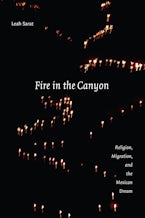Fire in the Canyon
Religion, Migration, and the Mexican Dream
The canyon in central Mexico was ablaze with torches as hundreds of people filed in. So palpable was their shared shock and grief, they later said, that neither pastor nor priest was needed. The event was a memorial service for one of their own who had died during an attempted border passage. Months later a survivor emerged from a coma to tell his story. The accident had provoked a near-death encounter with God that prompted his conversion to Pentecostalism.
Today, over half of the local residents of El Alberto, a town in central Mexico, are Pentecostal. Submitting themselves to the authority of a God for whom there are no borders, these Pentecostals today both embrace migration as their right while also praying that their “Mexican Dream”—the dream of a Mexican future with ample employment for all—will one day become a reality.
Fire in the Canyon provides one of the first in‑depth looks at the dynamic relationship between religion, migration, and ethnicity across the U.S.-Mexican border. Faced with the choice between life‑threatening danger at the border and life‑sapping poverty in Mexico, residents of El Alberto are drawing on both their religion and their indigenous heritage to demand not only the right to migrate, but also the right to stay home. If we wish to understand people's migration decisions, Sarat argues, we must take religion seriously. It is through religion that people formulate their ideas about life, death, and the limits of government authority.
Contributor Bios
Reviews
"Sarat offers a fascinating ethnographic examination of the intersection of popular religious practices, Pentecostal faith, and the necessity forced upon individuals in economically challenging circumstances to migrate from Mexico to the United States." ~ Choice
"Fire in the Canyonwill engage readers at all levels with its accessible prose and memorable life stories. The chapter on Caminata Nocturna should especially interest undergraduate students with its unique perspectives on border crossing. [] Sarat conveys the great dedication to community that persists in this town, despite all the divisions that it facesof religious factionalism, modernization, and, most of all, immigration." ~ Hispanic American Historical Review
"[T]his study is an important contribution to migration studies, Pentecostal theology and the wider field of religion and the migration experience. While it is about the Mexican migration experience, it has implications for and is a resource for migration on a whole, especially that of the two-thirds world." ~ Pneuma
"Beautifully illustrates the complex intersections of religion and immigration, where even the successful navigation of the dangerous migrants journey across the U.S. border results not in the 'American dream,' but in continued poverty and marginalization. . . . Religion within the context of immigration is not merely one of 'the things they carry,' but fundamental to the journey, helping migrants to frame their understanding of suffering, to confront life-and-death, and to define their notions of the possible. Yet Sarat suggests that this understanding alone is not enough, arguing that religionmodern Pentecostalism in particularhelps empower people to look beyond simple religious tropes and issues of individual salvation to join collective efforts that seek to address the roots causes of migration and inequality." ~ Virginia Garrard-Burnett,The University of Texas at Austin
"Through finely woven voices and descriptions of actors and locations in a life drama that transcends geographical and religious borders, Leah Sarats ethnography of the indigenous people of El Alberto . . . offers its readers an opportunity to witness the fantastic capacity of seemingly marginal peoples to selectively appropriate religious and economic impositions in an effort to carve out a future that makes sense to them, and, hopefully their children." ~ Ella Schmidt,author of The Dream Fields of Florida: Mexican Farmworkers and the Myth of Belonging
 This work is licensed under a
Creative Commons Attribution-NonCommercial-ShareAlike 4.0 International License
(CC BY-NC-SA).
This work is licensed under a
Creative Commons Attribution-NonCommercial-ShareAlike 4.0 International License
(CC BY-NC-SA).


